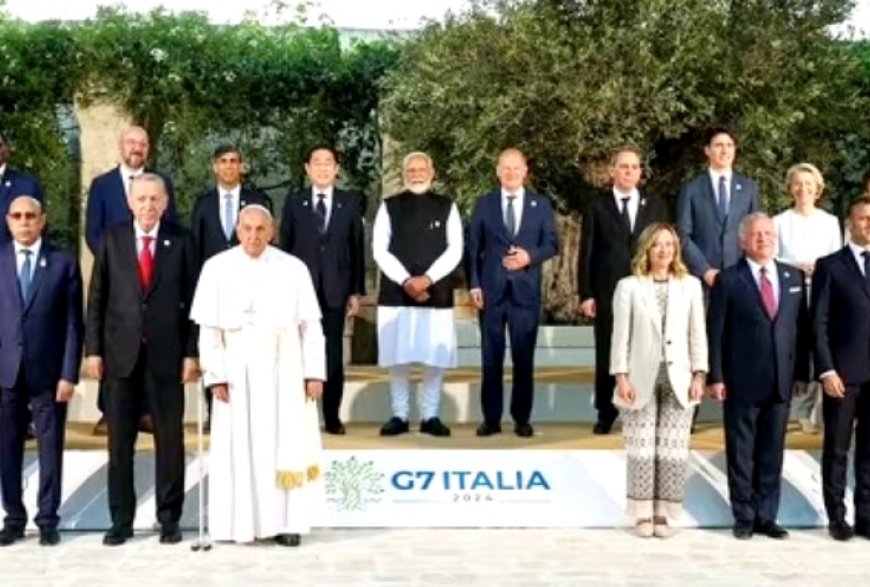G7 Summit Emphasizes India-Europe Corridor Amid West Asia Tensions; China Poses A Potential Challenge
G7 Summit has laid emphasis on the India-Middle East-Europe Economic Corridor (IMEC) to improve strategies ties among the countries.

The recently concluded G7 Summit in Italy, which saw the presence of world leaders, emphasized the importance of the India-Middle East-Europe Economic Corridor (IMEC) to strengthen strategic ties among the countries. However, tensions in West Asia may have delayed the project. On June 14, the communique was issued following the customary “family photo” at Borgo Egnazia in Italy. During the G7 summit, the leaders also reaffirmed their commitment to a “free and open Indo-Pacific” based on the rule of law.
“We will further promote concrete G7 PGII (Partnership for Global Infrastructure and Investment) initiatives, flagship projects, and complementary initiatives to develop transformative economic corridors for quality infrastructure and investment, such as the deepening of our coordination and financing for the Lobito Corridor, the Luzon Corridor, the Middle Corridor, and the India-Middle East-Europe Economic Corridor, also building on the EU Global Gateway, the Great Green Wall Initiative, and the Mattei Plan for Africa launched by Italy,” the communique read.
It is worth noting that India has already initiated its part of work on the India-Middle East-Europe Economic Corridor which was announced last year on the sidelines of the G20 Leaders Summit in Delhi. However, there is lack of rail links in Saudi Arabia and other countries that need to be constructed and linked.
India-Middle East-Europe Economic Corridor
The IMEC is a diligent endeavor to foster and enhance commerce between India, regions across the Arabian Peninsula, Mediterranean zone, Europe and possibly Africa by developing and expanding indispensable infrastructure elements like ports, railways, road networks, sea routes, and pipelines. The project’s Memorandum of Understanding (MoU) was collaboratively inked in New Delhi in September 2023, amidst the proceedings of the G-20 summit by various countries including India, Saudi Arabia, United Arab Emirates (UAE), France, Germany, Italy, the United States, and the EU. Nations like Israel and Greece have also evinced their interest in actively participating in this project.
The Geopolitical Implications?
The October 7 Hamas attacks and ongoing Gaza tumult with Israel has left the IMEC with a fresh set of challenges. Jordan’s citizens; especially those of Palestinian origin, are vehemently against the notion of any projects that bridges the gap between Jordan and Israel. Standing firm against Israel’s aggressive stance in Gaza, the Jordanian government’s position is highlighted by The Carnegie Endowment for International Peace.
There’s a strand of thought arguing that the troublesome situations spurred by the upheaval in the Red Sea region could’ve been alleviated by IMEC’s intervention— possibly ensuring the smoother transportation of goods towards Europe. Yemen’s Houthi rebels recent assault resulted in substantial shipping delays in the Red Sea, forcing the ships to take prolonged routes. Seen as an allied effort to fortify strategic power, IMEC gets juxtaposed to China’s controversial Belt and Road Initiative (BRI)— often put in the negative light for lacking transparency and not respecting national sovereignty.
How IMEC Crucial For India?
India’s government has set its sights on intensifying commerce and economic relations with the countries of the Arab Gulf. The main vehicle to achieve this is the IMEC initiative, which presents a promising avenue for growth. The initiative aims to tackle gaps in infrastructure and connectivity, thus further cementing India’s ties not just with the Arab Gulf, but with regional allies such as Israel and Jordan. This move paves the way for Indian corporations to explore investment opportunities in the development of the required infrastructure. Also, the IMEC opens the door to a potentially quicker route to the Eastern Mediterranean and Western Europe, avoiding the usual checkpoints at Bab al-Mandab and the Suez Canal. Supporting the IMEC lines up with India’s broader aspirations of taking a lead in the global circuit, building on its improving economic conditions since 1991 and its active participation in the G20.
Is China A Threat?
Despite the U.S. championing the International Maritime East-West Corridor as a competitor to the Belt and Road Initiative, China’s sway along its potential path is undeniable. One of the key points of this corridor is the port of Piraeus in Greece, the biggest port in Eastern Europe, set to receive cargo from Haifa port, Israel. It’s worth noting that since 2016, Chinese shipping giant, Cosco, has held the lion’s share of the port after acquiring a two-thirds stake from the Greek government. This gives Cosco the power to guide its future, supervising the piers and terminals, as highlighted by the Carnegie Endowment for International Peace.
Moreover, the robust economic ties between China and the Arab Gulf nations might be a stumbling block for the corridor’s future. In 2022, the trade flow between Saudi Arabia and China exceeded $106 billion – almost twice the amount when compared to U.S.-Saudi trade. Further, China owns a minority 20% stake in Saudi Arabia’s largest port, the Red Sea Gateway Terminal. Additionally, non-oil trade between China and the United Arab Emirates crossed the $72 billion mark in 2022, with China already funding a series of developmental projects.
What's Your Reaction?


























































